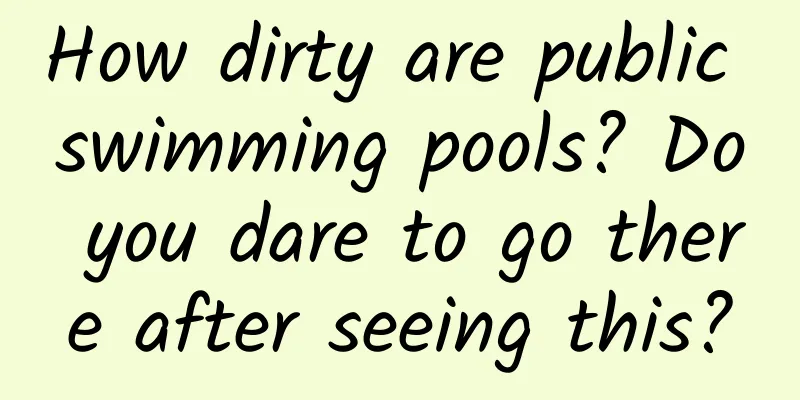How dirty are public swimming pools? Do you dare to go there after seeing this?

|
Spring is here, and many people have made or restarted their fitness plans, and many choose to swim in public swimming pools. However, I would like to remind you that the water in public swimming pools is not as clean as we see it, but hides some health risks. Perhaps from the moment you enter the water, you have the most intimate contact with various pollutants. 01 There are a lot of human metabolites in swimming pool water You may not have noticed that when we come into close contact with the water in the swimming pool, some of the body's metabolic products, such as sweat, saliva, dandruff, dirt, hair, etc., will unconsciously enter the water[1]. Particles of skin care products and cosmetics will enter the water[2]. Even some people's urine and feces will be left in the water intentionally or unintentionally. So how much urine does a swimming pool actually contain? In 2017, a team led by Professor Xingfang Li from the University of Alberta in Canada published an article in Environmental Science & Technology Letters, stating that they had tested water samples from 87 swimming pools and found that the average amount of urine in a swimming pool was about 75 liters, which is about the amount of urine in 140 bottles of 550 ml mineral water [3]. In July 2015, the Social Survey Center of China Youth Daily conducted a survey of 1,436 people. Respondents said that the most common uncivilized behaviors encountered in public swimming pools include: not showering before entering the pool (59.3%), urinating in the pool (57.1%), not wearing a swimming cap when swimming (55.6%), not soaking feet before entering the pool (55.4%), spitting in the pool (46.9%), scrubbing in the pool (39.9%), and entering the pool while suffering from infectious diseases (27.8%) [4]. These uncivilized behaviors will pollute the water in the pool and pose a health hazard to others. 02 Excessive chlorine-containing disinfectants cause irritation to the human body Because the metabolites brought into the swimming pool by the human body provide a good environment for the reproduction of microorganisms in the pool water, in order to prevent the massive reproduction of microorganisms, swimming pools not only circulate and filter the pool water, but also add chlorine-containing disinfectants. When chlorine comes into contact with water, it will form hypochlorous acid, which reacts with urea in the swimming pool to form chloramines. Chloramines have an odor, which is the pool odor we often smell when we walk into a public swimming pool. Excessive addition of chlorine-containing disinfectants can also pose health risks to the human body. Because if too little chlorine-containing disinfectant is added, the pool water cannot be effectively disinfected in time, and microorganisms will multiply in large numbers, threatening human health. Therefore, some swimming pools will add a large amount of chlorine-containing disinfectants, but if too much of this thing is added, excessive chloramines will irritate human skin, eyes and lungs, especially children, the elderly and other sensitive people. After staying in the water for a long time, their eyes will become red, their hands will become wrinkled and white, and their hair will become frizzy. This is the chloramines that are causing the problem. Beijing Municipal Health Supervision Bureau law enforcement officers sampled two pool water samples from a public swimming pool and found residual chlorine values of 1.54 mg/L and 1.41 mg/L respectively. According to national standards, the residual chlorine concentration in pool water should be maintained between 0.3 and 0.5 mg/L. The test result was three times the national standard, posing a risk to the health of swimmers. [5] 03 How to choose a clean and hygienic public swimming pool The sanitation of public swimming pools is indeed not to be underestimated, so how do we choose a clean and hygienic swimming pool? Here is a tip for readers: when choosing a public swimming pool, you should "look three times and smell one thing". Three Looks Check the documents. Check whether the public swimming pool has a valid health license; check whether the public swimming pool has complete water quality test reports and self-inspection results; check whether the public swimming pool has a health check post, and check whether there is a clear sign at the entrance that says "No entry for patients with hepatitis, severe trachoma, acute hemorrhagic conjunctivitis, otitis media, intestinal infectious diseases, mental illness, sexually transmitted diseases, and alcoholics." 2. Look at the number of people. Public swimming pools should ensure that each person has an average water surface area of more than 2.5 square meters. Too many people in the pool will affect the water quality. 3. Check the water quality. Check whether the water is clear, whether there are any floating objects in the water, and whether there are any sediments at the bottom of the pool. Smell Smell the odor. Smell the locker room and toilet to see if there is any peculiar smell, and whether the ventilation system is running well; smell the swimming pool to see if there is a "pool smell". If the smell is choking, it may be that too much chlorine-containing disinfectant has been added, which can easily irritate the human body. 04 Take good personal protection and eliminate uncivilized behavior When swimming, we should also take good personal protection and avoid uncivilized behavior, to protect our own health and the health of others. We should: Wear a complete set of swimsuits, swimming caps, goggles, nose plugs, and earplugs. If water gets into your goggles during swimming, do not rub your eyes directly with your hands, but rinse your eyes and goggles with clean water; if you choke on water during swimming, rinse your mouth with clean water in time. Actively eliminate uncivilized behavior, including: concealing infectious diseases that are not suitable for entering public swimming pools before entering the swimming pool, not showering or soaking feet before entering the pool, spitting, urinating, defecating, spitting, scrubbing, etc. in the swimming pool. People with sensitive constitutions should not swim for too long or too frequently to prevent allergies. Rinse your body with clean water immediately after swimming. Wash your swimsuit, swimming cap, goggles, nasal congestion, and ear plugs after returning home. If you feel discomfort in your eyes, ears, mouth, skin, lungs, or private parts, please seek medical attention immediately. References: [1] Gao Fengchuan, Chen Yongsheng, Zhao Lin. Investigation and analysis of the sanitary conditions of swimming pools in Qingdao [J]. Chinese Journal of Public Health Management, 2006, 22(15):403. [2] Jia Yi. A warning bell for swimming pool safety and sanitation [J]. Shanghai Quality, 2020(8):73-75. [3]Lindsay K. Jmaiff Blackstock, Wei Wang, Sai Vemula, Benjamin T. Jaeger, Xing-Fang Li. Sweetened Swimming Pools and Hot Tubs[J]. Environmental Science & Technology Letters, 2017; DOI: 10.1021/acs.estlett.7b00043 [4]http://news.cntv.cn/2015/07/20/ARTI1437356867721758.shtml [5]https://mp.weixin.qq.com/s/9MBkeDxTZbwtXBkCKRNvtA The article is produced by Science Popularization China-Creation Cultivation Program. Please indicate the source when reprinting. Produced by: Science Popularization Department of China Association for Science and Technology Producer: China Science and Technology Press Co., Ltd., Beijing Zhongke Xinghe Culture Media Co., Ltd. Author: Zeng Xinyue, popular science creator Review丨Zhang Yu, researcher/PhD, Chinese Center for Disease Control and Prevention, national health science expert |
<<: Hyperthermia vs. Childhood Cancer
>>: @Middle-aged and young people: Don’t step on the cancer “minefield”
Recommend
What to eat when ovarian function is not good?
The ovaries play the important role of secreting ...
How to cheer up my girlfriend when she is upset?
Women's minds are very meticulous and more de...
Is Ba Duan Jin a type of Tai Chi? What is the difference between Ba Duan Jin and Tai Chi?
Ba Duan Jin is an independent and complete set of...
Why do I always have nightmares when I sleep at night?
As the saying goes, you dream about what you thin...
Do you have these 4 bad habits? No wonder your liver is "on strike"...
The liver, the largest solid organ in the human b...
How to wear bras correctly for small breasts
If women wear too thin clothes during daily trave...
775 new cases in 6 days, infection can be transmitted even without meeting! Urgent reminder →
Recently, the dengue fever epidemic situation in ...
What are the types of gynecological diseases?
When it comes to gynecological diseases, everyone...
What should women do if they have urinary tract infection and urination is painful and bleeding?
Urinary tract infection is a common clinical dise...
What to do if your throat hurts after abortion
I just turned 23 in 2020. I got a boyfriend last ...
What fruits are good to eat after abortion?
There are many married couples in life who cannot...
What causes calf cramps in pregnant women?
Cramps are a common problem in life. They are one...
Will the clutch become hard if you often drive in low gear? Under what circumstances will the clutch become hard?
When it comes to our car driving, especially manu...
What should I do if my wisdom teeth hurt? Just know these points
I believe many people have experienced the tortur...







![[Medical Q&A] How to deal with hair loss during chemotherapy?](/upload/images/67effb66a29bd.webp)

